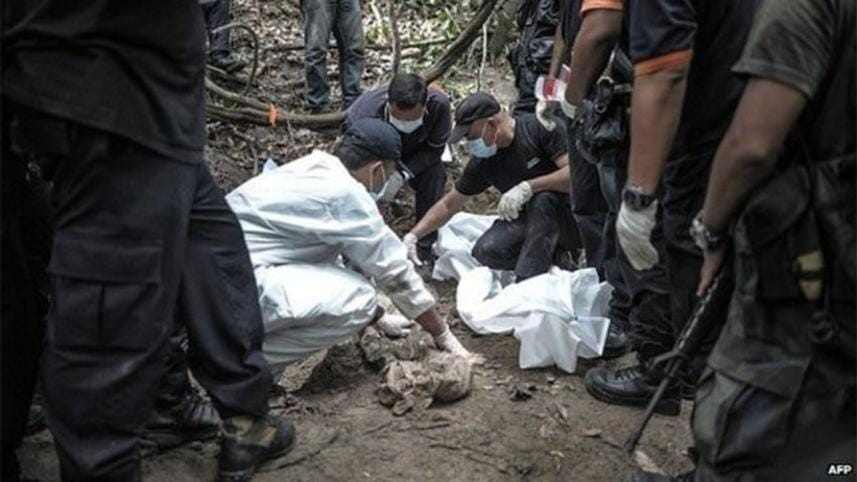Malaysian police probed over graves

Malaysia has detained 12 policemen suspected of human trafficking, two of whom are said to be connected to recently discovered jungle graves.
Deputy Home Minister Wan Junaidi Tuanku Jaafar said the two officers were suspected of transporting migrants.
He also clarified that the 139 graves found on the border with Thailand were not mass graves.
The route is used by people-smugglers bringing migrants from Myanmar and Bangladesh into Malaysia.
The migrants are mainly Rohingya Muslims fleeing persecution in Myanmar - also known as Burma - or economic migrants from Bangladesh.
Torture and abuse
Wan Junaidi told reporters on Thursday that of the 12 officers arrested, "two of them are suspects connected to the graves at Wang Kelian", in a reference to a northern village by the Thai border.
Authorities suspect the graves, found near abandoned human trafficking camps in the jungle, hold the remains of migrants.
They had earlier thought the graves each held multiple bodies, but Wan Junaidi said it was "one person, one grave".
He added that the bodies appeared to have been "properly" buried and were wrapped with white shrouds, according to Islamic funeral tradition.
Authorities confirmed the existence of the graves earlier this week, and have begun exhumations.
They have also taken reporters to see the camps which showed signs of torture and abuse, such as suspected human "cages".
Reports in Malaysian media questioned whether officials on both sides of the border were complicit.
Thai police uncovered similar abandoned camps on the Thai side of the border earlier in May.
It triggered a crackdown on human trafficking that appears to have led traffickers to abandon their human cargo on boats in the waters off Thailand.
The boats, crammed with hundreds of starving migrants, started coming ashore in Malaysia and Indonesia.
Facing international pressure, the two countries agreed to provide temporary shelter for the migrants on the condition that they will be repatriated by other countries within a year.
Dalai Lama's plea
Meanwhile, the Tibetan Buddhist spiritual leader Dalai Lama called on Myanmar's Aung San Suu Kyi to do more to support Rohingyas, in an interview with The Australian newspaper.
Suu Kyi, seen as a democracy icon, has faced international criticism for refusing to speak on the Rohingyas, who are not recognised in Myanmar as citizens.
The issue is highly sensitive in Buddhist-majority Myanmar where Suu Kyi's political party will contest elections later this year.
Asia's migrant crisis
- Rohingya Muslims mainly live in Myanmar, where they have faced decades of persecution.
- Rights groups say migrants feel they have "no choice" but to leave, paying people smugglers to help them.
- The UN estimates more than 120,000 Rohingyas have fled in the past three years.
- Traffickers usually take the migrants by sea to Thailand then overland to Malaysia.
 For all latest news, follow The Daily Star's Google News channel.
For all latest news, follow The Daily Star's Google News channel.
Comments